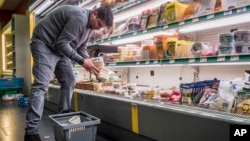Whether buying a fish fillet at a supermarket or ordering steak in a restaurant, consumers will soon be able to use their phones to check instantly whether their food is green and ethical. Launched by environmental group WWF and investment firm BCG Digital Ventures, OpenSC is a website that harnesses blockchain technology to allow users to scan a QR code on a product or menu that reveals the full history and supply chain before they buy.
"For those catching and producing things in a very unsustainable way, it's quite easy for them to hide behind the complexity of supply chains," said Paul Hunyor, Asia region head at BCG Digital Ventures in Sydney.
"There is a lack of carrots for those doing good at the production end because it is very hard for them to make the end consumer aware of all the good work they're doing," he told the Thomson Reuters Foundation.
Globally, consumers and retailers are demanding more information about what they procure, buy and eat, to ascertain that its production and transportation does not damage the environment, or use illegal and unethical business practices. In response, large consumer goods companies, restaurants and other businesses are looking at ways to attract more customers by offering sustainable products that are guaranteed as free of deforestation or slave labor, for example.
The OpenSC platform, conceived in 2017 when WWF was piloting a tuna fisheries traceability project in the Pacific Ocean, will initially focus on fish and beef. It plans to expand in the next two years to cover other commodities like palm oil and timber. OpenSC allows consumers to cut through the complexity and lack of transparency in supply chains, said Hunyor. The digital tool will cover environmental, social and human rights, and hopes to attract sustainability bodies and schemes, as well as corporations and major commodities producers, said Dermot O'Gorman, CEO of WWF-Australia.
"There is ... growing momentum around the world with corporates who are doing and want to do the right thing because their customers are increasing demand,” he said. Austral Fisheries, which is part of the Maruha Nichiro Group, has committed to implement OpenSC this year across its fleet which catches Patagonian toothfish. Customers and staff of supermarkets and restaurants, as well as wholesalers, can use the tool to access instant information.
For fish, that would include where it was caught, if the area is a verified sustainable fishing zone, and conditions along the supply chain. Fish tracked by OpenSC, set up as a social enterprise, will be served at a dinner for world leaders at the World Economic Forum in Davos next week.





